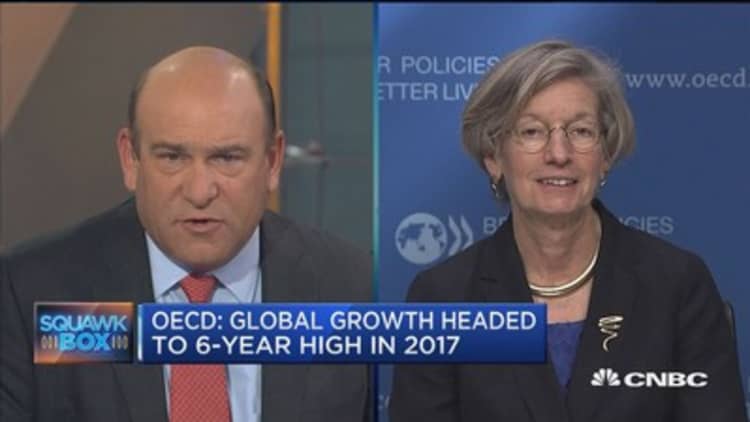
While concerns about the global economy continue to plague investors, Paris-based OECD has forecast that the global economy is on course for its fastest growth in close to six years but has warned that countries need to strive to do better.
The Organization for Economic Co-operation and Development has predicted that the global economy is set to grow 3.5 percent in 2017, followed by an increase to 3.6 percent in 2018 as confidence is increasing and investment and trade are picking up from low levels.
"It's a little more optimistic than last year," Catherine Mann, chief economist at OECD told CNBC Wednesday.
"What we've seen is some cyclical uptick across the board, in terms of consumption,
However, she added that more progress needs to be made in order to ensure sustainable growth forecasts.
"We don't think that we can be assured that those kinds of improvements are going to be durable. We have not seen real wage growth, we have not seen improvements in productivity growth, and until we get those two things in place we don't think we have a sustainable recovery going forward.
The OECD
"Everything is relative. What I would not like us to do is celebrate the fact that we're moving from very bad to mediocre," said Gurria, adding that this doesn't mean the world has to get used to it or live with it but has to continue to strive to do better.
U.S. downgraded
Although the OECD upped its forecasts for global growth for 2017, it downgraded its estimates for the United States, despite a weaker dollar boosting exports and tax cuts supporting household business investment. The growth forecast for U.S. was downgraded to 2.1 percent this year and 2.4 percent next year, down from estimates in March of 2.4 percent and 2.8 percent, respectively.
Mann attributed this drop in
"The progress on making some of those changes in fiscal policy, both on the spending and the tax side, have been delayed and so we're putting off some of the
Meanwhile, the forecast for
The OECD in its report also warns that financial vulnerabilities continue to cloud the projections. "Geopolitical shocks and trade protectionism could catalyze snap-backs in asset prices and realize downside risks through a variety of channels."
Monetary policy moving forward
Monetary policy, however, is appropriately moving forward, according to the OECD, towards a more neutral stance in the United States as well Europe and Japan are using forward guidance. But an integrated policy approach is needed to make the whole system work better for more people, the OECD says.
"Beyond domestic policies, on the international front, policymakers need to harness the full range of international economic cooperation tools to level the playing field to ensure that international trade is governed by fair rules that are followed, that all businesses adhere to high standards of conduct, that cross-border tax arrangements are transparent and fair, that corruption is reduced, and that labor and environmental standards are respected."


